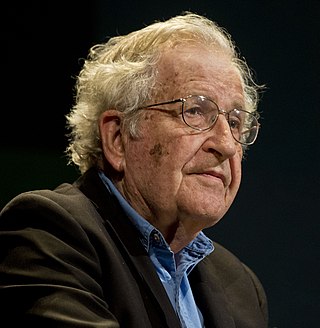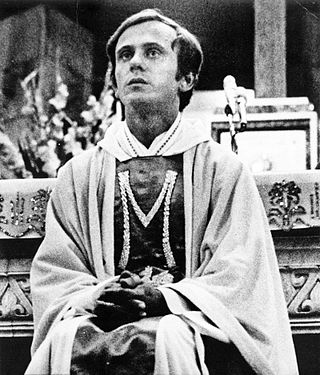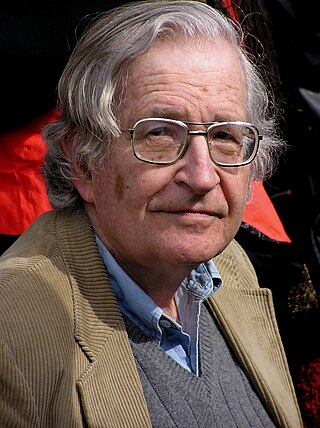
Avram Noam Chomsky is an American public intellectual known for his work in linguistics, political activism, and social criticism. Sometimes called "the father of modern linguistics", Chomsky is also a major figure in analytic philosophy and one of the founders of the field of cognitive science. He is a laureate professor of linguistics at the University of Arizona and an institute professor emeritus at the Massachusetts Institute of Technology (MIT). Chomsky has written more than 150 books on topics such as linguistics, war, and politics. Ideologically, he aligns with anarcho-syndicalism and libertarian socialism.

Universal grammar (UG), in modern linguistics, is the theory of the innate biological component of the language faculty, usually credited to Noam Chomsky. The basic postulate of UG is that there are innate constraints on what the grammar of a possible human language could be. When linguistic stimuli are received in the course of language acquisition, children then adopt specific syntactic rules that conform to UG. The advocates of this theory emphasize and partially rely on the poverty of the stimulus (POS) argument and the existence of some universal properties of natural human languages. However, the latter has not been firmly established, as some linguists have argued languages are so diverse that such universality is rare. It is a matter of empirical investigation to determine precisely what properties are universal and what linguistic capacities are innate.
In linguistics, transformational grammar (TG) or transformational-generative grammar (TGG) is part of the theory of generative grammar, especially of natural languages. It considers grammar to be a system of rules that generate exactly those combinations of words that form grammatical sentences in a given language and involves the use of defined operations to produce new sentences from existing ones. The method is commonly associated with American linguist Noam Chomsky.

David Joel Horowitz is an American conservative writer. He is a founder and president of the right-wing David Horowitz Freedom Center (DHFC); editor of the Center's website FrontPage Magazine; and director of Discover the Networks, a website that tracks individuals and groups on the political left. Horowitz also founded the organization Students for Academic Freedom.

Jerzy Popiełuszko was a Polish Roman Catholic priest who became associated with the opposition Solidarity trade union in communist Poland. He was murdered in 1984 by three agents of Służba Bezpieczeństwa, who were shortly thereafter tried and convicted of the murder.

Robert Faurisson was a British-born French academic who became best known for Holocaust denial. Faurisson generated much controversy with a number of articles published in the Journal of Historical Review and elsewhere, and by letters to French newspapers, especially Le Monde, which contradicted the history of the Holocaust by denying the existence of gas chambers in Nazi death camps, the systematic killing of European Jews using gas during the Second World War, and the authenticity of The Diary of Anne Frank. After the passing of the Gayssot Act against Holocaust denial in 1990, Faurisson was prosecuted and fined, and in 1991 he was dismissed from his academic post.

The propaganda model is a conceptual model in political economy advanced by Edward S. Herman and Noam Chomsky to explain how propaganda and systemic biases function in corporate mass media. The model seeks to explain how populations are manipulated and how consent for economic, social, and political policies, both foreign and domestic, is "manufactured" in the public mind due to this propaganda. The theory posits that the way in which corporate media is structured creates an inherent conflict of interest and therefore acts as propaganda for anti-democratic elements.

Generative grammar, or generativism, is a linguistic theory that regards linguistics as the study of a hypothesised innate grammatical structure. It is a biological or biologistic modification of earlier structuralist theories of linguistics, deriving ultimately from glossematics. Generative grammar considers grammar as a system of rules that generates exactly those combinations of words that form grammatical sentences in a given language. It is a system of explicit rules that may apply repeatedly to generate an indefinite number of sentences which can be as long as one wants them to be. The difference from structural and functional models is that the object is base-generated within the verb phrase in generative grammar. This purportedly cognitive structure is thought of as being a part of a universal grammar, a syntactic structure which is caused by a genetic mutation in humans.
The Faurisson affair was an academic controversy following publication of a book, Mémoire en défense (1980), by French professor Robert Faurisson, a Holocaust denier, and the inclusion of an essay by American linguist Noam Chomsky, entitled "Some Elementary Comments on the Rights of Freedom of Expression", as an introduction to Faurisson's book.

Hegemony or Survival: America's Quest for Global Dominance is a study of the American empire written by the American linguist and political activist Noam Chomsky, a professor at the Massachusetts Institute of Technology. It was first published in the United States in November 2003 by Metropolitan Books and then in the United Kingdom by Penguin Books.
Edward Samuel Herman was an American economist, media scholar and social critic. Herman is known for his media criticism, in particular the propaganda model hypothesis he developed with Noam Chomsky, a frequent co-writer. He held an appointment as Professor Emeritus of finance at the Wharton School of Business of the University of Pennsylvania. He also taught at Annenberg School for Communication at the University of Pennsylvania.

Syntactic Structures is an influential work in linguistics by American linguist Noam Chomsky, originally published in 1957. It is an elaboration of his teacher Zellig Harris's model of transformational generative grammar. A short monograph of about a hundred pages, Chomsky's presentation is recognized as one of the most significant studies of the 20th century. It contains the now-famous sentence "Colorless green ideas sleep furiously", which Chomsky offered as an example of a grammatically correct sentence that has no discernible meaning. Thus, Chomsky argued for the independence of syntax from semantics.

Noam Chomsky is an intellectual, political activist, and critic of the foreign policy of the United States and other governments. Noam Chomsky describes himself as an anarcho-syndicalist and libertarian socialist, and is considered to be a key intellectual figure within the left wing of politics of the United States.

The term Cartesian linguistics was coined by Noam Chomsky in his book Cartesian Linguistics: A Chapter in the History of Rationalist Thought (1966). The adjective "Cartesian" pertains to René Descartes, a prominent 17th-century philosopher. As well as Descartes, Chomsky surveys other examples of rationalist thought in 17th-century linguistics, in particular the Port-Royal Grammar (1660), which foreshadows some of his own ideas concerning universal grammar.
In linguistics, the innateness hypothesis holds that humans are born with at least some knowledge of linguistic structure. On this hypothesis, language acquisition involves filling in the details of an innate blueprint rather than being an entirely inductive process. The hypothesis is one of the cornerstones of generative grammar and related approaches in linguistics. Arguments in favour include the poverty of the stimulus, the universality of language acquisition, as well as experimental studies on learning and learnability. However, these arguments have been criticized, and the hypothesis is widely rejected in other traditions such as usage-based linguistics. The term was coined by Hilary Putnam in reference to the views of Noam Chomsky.

In linguistics, the term formalism is used in a variety of meanings which relate to formal linguistics in different ways. In common usage, it is merely synonymous with a grammatical model or a syntactic model: a method for analyzing sentence structures. Such formalisms include different methodologies of generative grammar which are especially designed to produce grammatically correct strings of words; or the likes of Functional Discourse Grammar which builds on predicate logic.

Occupy is a short study of the Occupy movement written by the American academic and political activist Noam Chomsky. Initially published in the United States by the Zuccotti Park Press as the first title in their Occupied Media Pamphlet Series in 2012, it was subsequently republished in the United Kingdom by Penguin Books later that year.

Cambodian genocide denial was the belief expressed by many Western academics that claims of atrocities committed by the Khmer Rouge government (1975–1979) in Cambodia were much exaggerated. Many scholars of Cambodia and intellectuals opposed to the U.S. involvement in the Vietnam War denied or minimized the human rights abuses of the Khmer Rouge, characterizing contrary reports as "tales told by refugees" and U.S. propaganda. They viewed the assumption of power by the Communist Party of Kampuchea as a positive development for the people of Cambodia who had been severely impacted by the Vietnam War and the Cambodian Civil War. On the other side of the argument, anti-communists in the United States and elsewhere saw in the rule of the Khmer Rouge vindication of their belief that the victory of Communist governments in Southeast Asia would lead to a "bloodbath."

Decoding Chomsky: Science and Revolutionary Politics is a 2016 book by the anthropologist Chris Knight on Noam Chomsky's approach to politics and science. Knight admires Chomsky's politics, but argues that his linguistic theories were influenced in damaging ways by his immersion since the early 1950s in an intellectual culture heavily dominated by US military priorities, an immersion deepened when he secured employment in a Pentagon-funded electronics laboratory in the Massachusetts Institute of Technology.
Anti anti-communism is opposition to anti-communism as applied in the Cold War. The term was first coined by Clifford Geertz, an American anthropologist at the Institute for Advanced Study, who defined it as being applied in "the cold war days" by "those who ... regarded the [Red] Menace as the primary fact of contemporary political life" to "[t]hose of us who strenuously opposed [that] obsession, as we saw it ... with the insinuation – wildly incorrect in the vast majority of cases – that, by the law of the double negative, we had some secret affection for the Soviet Union." Stated more simply by Kristen Ghodsee and Scott Sehon, "the anthropologist Clifford Geertz wrote that you could be 'anti anti-communism' without being in favour of communism."














